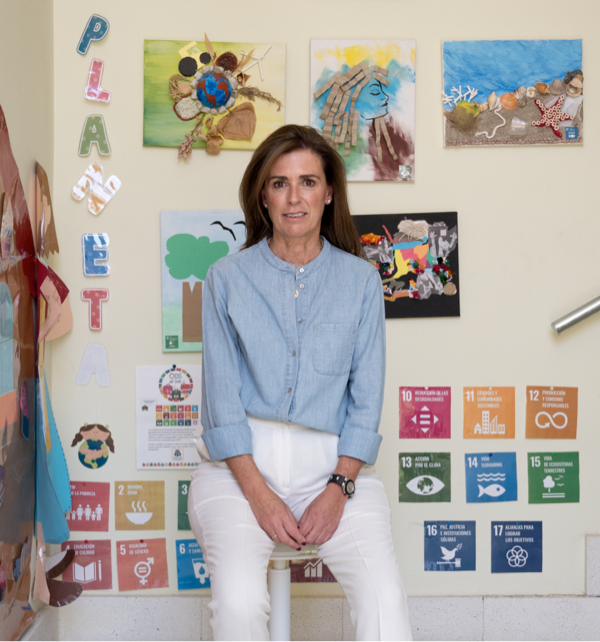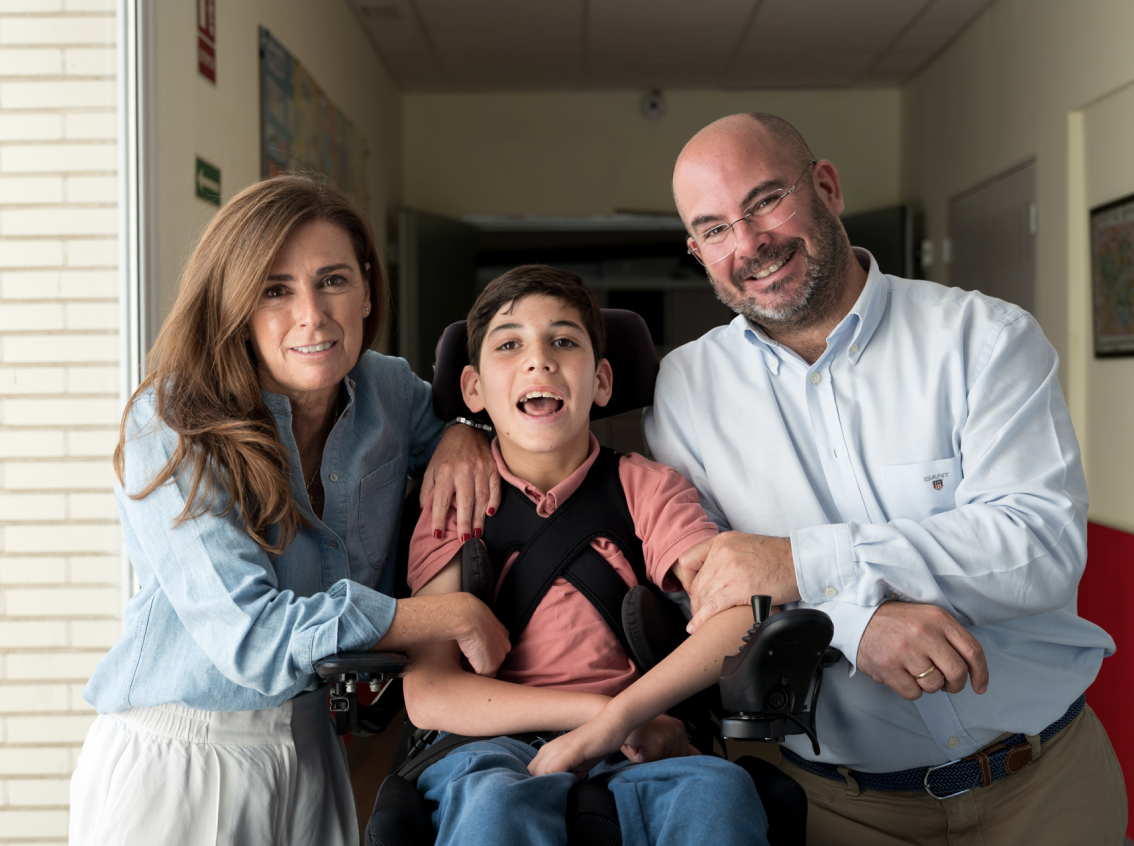The well-being of people with cerebral palsy
Twenty-seven years later, she is the managing director of the Numen Foundation, where she coordinates a team of 80 professionals who care for people with severe cerebral palsy. ‘We try to respond to their needs through an early care service, a special education school and an adult educational centre,’ explains Concha. ‘We pick them up from their homes in an adapted transport service and they spend the day here with us. The day starts at 8:30, with the arrival of the students and children from the day centre, and they are here with us receiving classes, training, rehabilitation, speech therapy, occupational therapy, psychological support, etc. They come above all to have fun and enjoy the therapies and classes they receive here’.
“When we started school he was in a wheelchair and now we take him walking by the hand to school. He is a child on the spectrum and has behavioural problems and, thanks to schools like this one, he is socialising better, he’s connecting with others better... everything”
Beatriz Martínez-Simancas, Julián's mother
One of the children who come to the Numen Foundation to have fun is Julián. He is four years old and has a rare disease that causes a 75% disability. His mother, Beatriz, says that ‘he has severe mobility problems, but little by little and thanks to all the work they are doing with him at Numen he can walk’.
‘His life since he entered the school two years ago has changed radically. His and ours, because we see him much more integrated into society and with us, and that makes us happier.’
Beatriz Martínez-Simancas, Julián's mother
Solar panels and aerothermal energy to take care of the planet
Difficulties that children like Julian often have include temperature regulation and breathing problems. ‘Brain damage can affect many things. It can affect your mobility or the part of your brain that regulates temperature so you don’t notice brusque changes. That part in most of four children doesn't work well,’ explains Beatriz. That makes heating and cooling especially important for the school, but achieving it is a challenge because of another difficulty that many of the students have: respiratory problems, which make it inadvisable to install air-conditioning.
This is one of the reasons why the Numen Foundation decided to transform the building's energy supply. They filled the roof with solar panels and also installed a aerothermal system, which allows the school to be heated and cooled with renewable energy without air conditioning. This technology uses air from outside to heat or cool water that circulates under the floor hot in winter and cool in summer, without producing the dryness of conventional air-conditioning systems. ‘This has allowed us to greatly improve comfort at the school,’ says Concha.
But health needs were not the only reason that led the Numen Foundation to this energy transformation: the environmental awareness of the students themselves also played an important role.

‘As with everything at this foundation, the project arose from its real protagonists: our children and young adults. Two years ago, the children at the school and the day centre decided to design all the educational content around the Sustainable Development Goals (SDGs), especially those dedicated to preserving our planet and making it better’
Concha Vereterra, Principal of Numen
‘They are just contagious. The professionals who work with them directly, those of us who work in the slightly more boring administrative area and the families, we all get swept away by their enthusiasm,’ says Concha, explaining how, by addressing sustainabilityin the educational materials, the students them selves asked the school to lead by example. ‘The Foundation decided to take up the baton of what our children were asking us to do, that we should contribute to a cleaner planet, and we decided to change our entire energy system, which was a pollutingone, for clean energy,’ she says.
A pool that frees you from your wheelchair
This transformation also had to overcome a challenge: the needs ofthe therapeutic pool, which Concha defines as one of the ‘crown jewels’ of the school. To have the desired effects on the students’ health, the water has to be kept at a temperature of 34 degrees.
And why is the pool so important?
Concha explains that the children at the school spend long hours in their wheelchairs, with their skin in constant contact with the seat and backrest without being able to move even a little. So the pool is ‘a wonderful resource because it allows them to leave their wheelchairs for a while and feel that weightlessness that we feel when you go into the water’.
‘Being in the water, in an environment where there's nothing pressing on them anywhere, with nothing around their body controlling their posture or anything, it's absolutely wonderful. And with the temperature of the water, the levels of stiffness go down a lot and they can really relax their bodies.’
Concha Vereterra, Principal of Numen
Beatriz confirms the importance of this resource for her son and his classmates. ‘One of the things we value most about the school is that Julián uses the heated pool a lot. The children have therapy there once a week, and for him it was a radical change.
"He was a child who could hardly touch the water. In the summer we had a lot of problems because we couldn't put him in the pool,’ says his mother, adding that this has changed a lot since he has been in the water every week at school. ‘He enjoys it and for us in summer now he and his sister can enjoy it,’ she says. He also appreciates the energy transformation of the pool:
‘The fact that it used to be heated by gas and now it’s heated by aerothermal energy and solar panels is amazing. The school's impact on the environment has been greatly reduced.’
Beatriz Martínez-Simancas, Julián's mother
Standing up, an adrenaline rush
Another of the school's services that is important for its students is physical therapy. Carlos, a 13-year-old boy who has been at Numen since he was four years old, is just such a patient. His father, Guillermo, says that, although he gets around independently in his wheelchair, ‘he needs a lot of treatments every day that are only possible at these kinds of schools’. ‘This school has a spectacular physical therapy department where they go out of their way to help the children. They do all kinds of therapies, they take the best of each of them, they see what can be applied to each child... Now, for example, with Carlos they are trying out a new treatment where they are putting him on his feet’, says Guillermo while he looks at his son with affection. ‘For Carlos, who sits in a wheelchair all day, standing up is such an adrenaline rush,’ he says. He is also grateful for the work the speech therapists do, who have developed a communication notebook with Carlos with which,

‘despite not knowing how to speak, he is able to communicate with everyone, he is able to make us understand what he needs, what he wants, and that is key for a child like this’.
Guillermo Díaz, Carlos' father
Guillermo, in addition to being Carlos' father, is on the board of trustees of the Numen Foundation and has coordinated the school’s energy transformation. He admits that at the beginning it was not easy to convince the families to start the project. They had already tried other air conditioning systems that had not worked and doubted that this one would, so there was reluctance to assume the initial financial outlay. Now he’s happy to report that he’s received complaints that it’s too cold on hot days: ‘These are the best complaints we could have heard because they prove that the installation works’.
Beatriz, Julián's mother, confirms that the response from the families has been very favourable: ‘That in addition to everything they do for us, they care about improving the facilities and contributing to the environment is really positive, it really shows what Numen is all about’. And the significant reduction in electricity consumption by using energy from their own solar panels has dispelled any lingering doubts about the economic efficiency of the project.
‘We’ve noticed a great deal in our bills from changing the system: around 30% savings on all our bills,’
Concha Vereterra, Principal of Numen
In any case, the positive assessment of this initiative goes beyond the reduction in bills or thermal comfort. ‘The children have felt that their demands have been heard, and that’s very important’, says the headmistress of the school. She adds: ‘Our children and young adults sometimes have few opportunities to actively participate in the decisions or organisations that are made or in place around them. So the satisfaction they have felt, especially the older ones at the school, when they’ve seen that their demands to work together for a clean planet, towards a goal of well-being for the planet, have been heard, has been extremely motivating for them’.
Enjoy the taste, cut the waste
The energy transformation is not the only project that the Numen Foundation has undertaken to improve the school’s sustainability and the well-being of its students. They recently decided to set up their own kitchen for the cafeteria instead of using a caterer, as they had done before. This has allowed them to guarantee local purchases and prevent a lot of waste: before, they would throw away whole trays of food that children who had not gone to class that day had not eaten. Now they cook to the number of people attending school and use what is left over to prepare another dish the next morning.
Textured food thanks to new technology.
Textured food Traditional foodPreparing food for people with cerebral palsy is a challenge, because many of them have problems with chewing and swallowing. For a long time, they had been limited to eating pureed food, with textures and flavours that were often very similar. But by putting in its own kitchen, the school took the opportunity to implement a technology that texturizes the food. That way they can take any dish from the general menu, like macaroni for instance, and turn it into a compact food that is not solid but not mashed either and retains all of its flavour. ‘This lets kids taste a lot of foods that they hadn’t been able to taste before,’ ,’ says Nuria, the foundation's nurse who oversees the cafeteria menus, adding: ‘They taste a lot more food and they think it’s great’.
When she describes this enthusiasm from her students, you can see how the children's joy is also her joy. Concha Vereterra likes her job, it shows, and she says it clearly: ‘This is the best job in the world’. She values ‘the satisfaction that comes from your hard work resulting in improvements in the quality of life of people, children, their families and society at large’. And she is grateful for how the people with cerebral palsy they work with brighten the lives of professionals like her:
‘This work means putting your problems to the side when you walk through the school door because, when we arrive here, the first thing we see is the smile on our children’s faces. So, if they smile, how can I not smile, how can you not see the joy in the little things, in their little achievements, in their day to day life? We are truly fortunate to be able to work with such wonderful people every day’.
